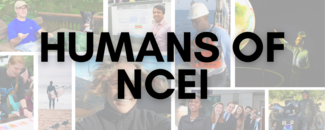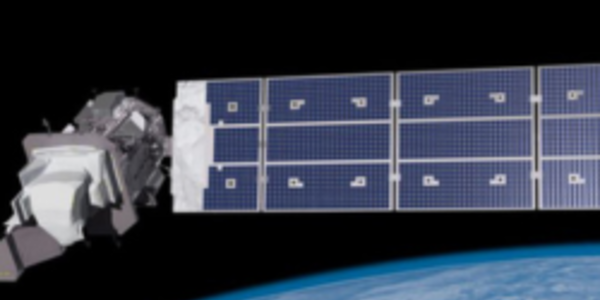
Here at NCEI, we aren’t just data—we are people. In our Humans of NCEI series, meet the awesome minds that manage one of the largest archives of atmospheric, coastal, geophysical, and oceanic research in the world. Get to know Monica Youngman, Chief of the Data Stewardship Division.
What is your job title?
Chief of the Data Stewardship Division.
What is your specific area of expertise?
My role is leading data stewardship, specifically the archive and access to NOAA's environmental data. My expertise is in leadership and data and program management.
What was your first job? How did it prepare you for your current position?
My very first job was working at a Barnes and Noble Café as a barista. This position taught me the value of customer service, how to work with a variety of people with diverse backgrounds, how to use creativity even in the most basic processes, and how to keep going in the face of unexpected challenges. These have all been useful lessons to problem solve and work as a team member as I went through my education and got my first job at NOAA.
How did you end up at NCEI?
I started my Federal Government career through the Presidential Management Fellowship Program after getting my masters in Environmental Management. My first job out of graduate school was with NOAA's National Geodetic Survey (NGS) in the National Ocean Service, where I worked for 9 years before joining NCEI. My last role at NGS was managing the gravity program, collecting airborne and terrestrial gravity data to support more accurate height measurements. During that time I learned the value of metadata and the challenges NOAA faces with providing discoverable, accessible data to the public. I came to NCEI for the opportunity to work across NOAA to improve the discoverability, accessibility, and usability of environmental data.
What does a usual workday look like for you?
My typical workday consists primarily of meeting with people across NCEI, NESDIS, NOAA, and external stakeholders to strategize on the direction of the organization, provide direction and management of programs, build partnerships with stakeholders, and inform NCEI, NESDIS, NOAA, and legislative interactions.
What question are you asked most often when someone finds out what you do? How do you respond?
The question I get asked most is if climate change is real. I tell people I am not a climate scientist, but I can vouch for the integrity of our historical environmental data that is the basis for climate science. Based on these data, NOAA climate scientists have shown that the Earth's climate has and is changing.
What sort of training and education would one need for your job?
For my position, the must-have education is a degree in physical or data science with physical science coursework. However, while the educational background is necessary, it is not sufficient. It's critical to have expertise and experience in leadership, program and project management, data management, and communication skills. It is also helpful, although not necessary, to have experience with NOAA in some way.
What inspired you to pursue a career in your field?
I see the enormous, untapped value of NOAA's environmental data and I want to help improve the knowledge, understanding, and use of those data to address the societal and environmental challenges we are facing today and for generations into the future.
What projects are you working on now? Are there any upcoming projects that you are excited about?
Currently, I'm excited about the work NCEI is doing with NESDIS to build and migrate to a cloud archive and access workflow. Moving to the Cloud is an amazing opportunity to provide the scalability, flexibility, and timeliness of services that our stakeholders want as well as a challenge to completely rethink how NCEI delivers services. It requires many people with different viewpoints, education, and experiences to come together, be creative, and problem solve.
What is your favorite aspect of your job?
Empowering people to solve problems, work together, and be successful in their careers and see that results in the success of the organization.
What challenges have you had to deal with in your career?
In my career, I've had to overcome perceptions that I wasn't "ready" for certain positions or didn't have the education necessary. My advice to those at any career level is to assume you can do something, try it, and many new things, and you never know when that will lead to your next opportunity or career. The more doors you try to open, even if they don't open, the more likely you are to find one you can walk through.
Who are you outside of your career?
Outside of my career, I am a mother of two daughters, partner, dancer, Girl Scout leader, and financial guru.
*Please note that all of the information was current through the publication date.




